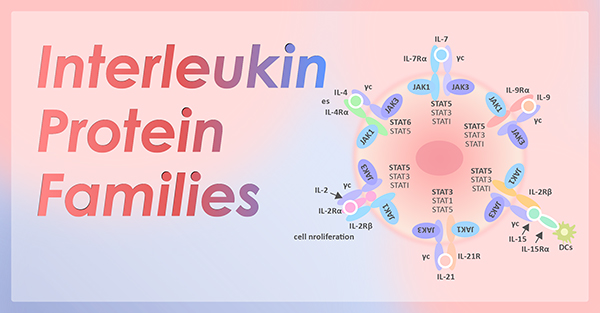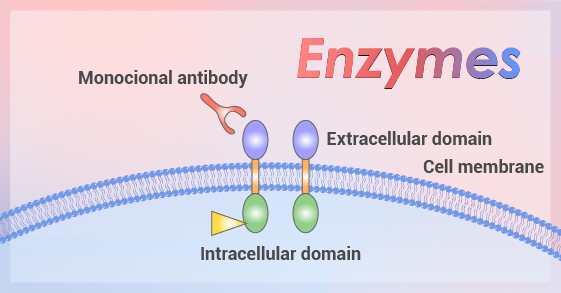
Leave message
Can’t find what you’re looking for?
Fill out this form to inquire about our custom protein services!
Inquire about our Custom Services >>


































 Request a FREE Sample of our FcRn Binding Kit!
Request a FREE Sample of our FcRn Binding Kit! Request a FREE Sample of our FcRn Binding Kit!
Request a FREE Sample of our FcRn Binding Kit!
 Limited Edition Golden Llama is here! Check out how you can get one.
Limited Edition Golden Llama is here! Check out how you can get one.  Limited Edition Golden Llama is here! Check out how you can get one.
Limited Edition Golden Llama is here! Check out how you can get one.
 Request a FREE sample of our GMP products!
Request a FREE sample of our GMP products!  Request a FREE sample of our GMP products!
Request a FREE sample of our GMP products!
> Inhibitor Screening Kits 
Inhibitor screening plays a crucial role in drug development, particularly in the early stages. The process involves screening a large number of candidate molecules to identify those with notable pharmacological effects, which are then further evaluated. To efficiently screen multiple potential inhibitors, rapid and sensitive tools are required.
To efficiently screen multiple potential inhibitors by developing an inhibitor screening platform based on the competitive ELISA method. We offer a series of high-sensitivity inhibitor screening kits that utilize unique in-house biotinylated proteins. These kits are designed for preliminary screening and quality control in drug development, providing researchers with reliable, efficient, and accurate tools for inhibitor screening.
| Quantity | 96 tests | |
| Detection Method | Colorimetric | |
| Method Type | Competitive ELISA | |
| Applications | High-throughput screening antibodies, small molecule inhibitors, peptide, etc. | |
![]() Accurate & Reliable: Verified raw materials with high batch-to-batch consistency ensure stable and reliable experimental results.
Accurate & Reliable: Verified raw materials with high batch-to-batch consistency ensure stable and reliable experimental results.
![]() Easy-to-use & Time-saving: Simple, 4-step ELISA procedure has been pre-validated to eliminate time-consuming method development and validations.
Easy-to-use & Time-saving: Simple, 4-step ELISA procedure has been pre-validated to eliminate time-consuming method development and validations.
![]() Minimal Matrix Effects: Interfering substances, including DMSO, were studied to ensure kit compatibility with small and macro-molecule inhibitors.
Minimal Matrix Effects: Interfering substances, including DMSO, were studied to ensure kit compatibility with small and macro-molecule inhibitors.
![]() High Repeatability: Kits are highly stable and have minimal lot-to-lot variation and use our site-specific biotin labeling platform.
High Repeatability: Kits are highly stable and have minimal lot-to-lot variation and use our site-specific biotin labeling platform.
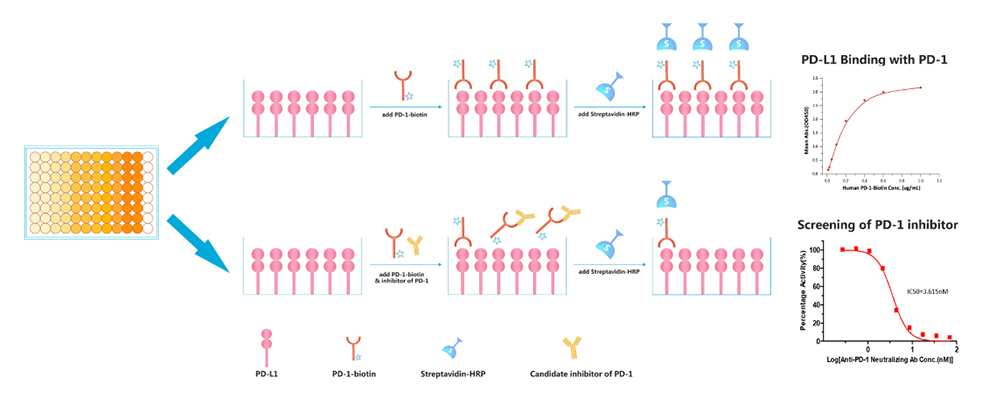
Notes: The assay employs a simple colorimetric ELISA platform which is based on the competitive binding technique. (The principles between different inhibitor screening kits are slightly different)
The experimental protocol includes 4 short steps:
Coat the plate with human PD-L1.
Add Human PD-1-Biotin to bind the coated human PD-L1.
Add your molecule of interest to the tests.
Add Streptavidin-HRP followed by TMB or other colorimetric HRP substrate.
Finally, the ability of your compound to inhibit PD-1: PD-L1 binding will be determined by comparing OD readings among different experimental groups.
Take PD-1 [Biotinylated] : PD-L1 Inhibitor Screening ELISA Kit (EP-101) for example.
| ID | Components | Size |
|---|---|---|
| EP101-C01 | High-bind Plate | 1 plate |
| EP101-C02 | Human PD-L1 | 25 μg |
| EP101-C03 | Anti-PD-1 Neutralizing Antibody | 20 μg |
| EP101-C04 | Human PD-1-Biotin | 5 μg |
| EP101-C05 | Streptavidin-HRP | 10 μg |
| EP101-C06 | Coating Buffer | 12 mL |
| EP101-C07 | 10xWashing Buffer | 50 mL |
| EP101-C08 | Blocking Buffer | 50 mL |
| EP101-C09 | Substrate Solution | 12 mL |
| EP101-C10 | Stop Solution | 7 mL |
| Cat. No. | Product Description | Detection mechanism | Order/Preorder |
|---|
Inhibition of PD-1: PD-L1 binding by anti-PD-1 neutralizing antibody measured using the PD-1 [biotinylated]: PD-L1 inhibitor screening ELISA assay pair (Cat. No. EP-101).
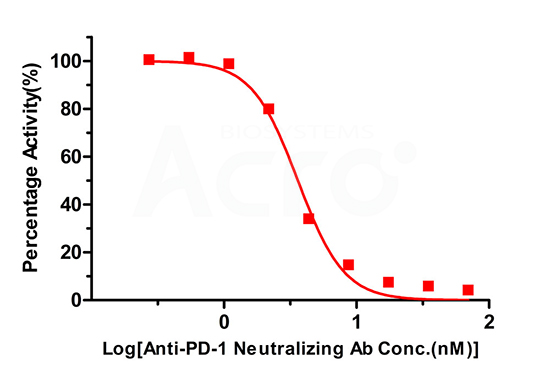
Anti-PD-1 neutralizing antibody was diluted from 10 μg/mL to 0.078 μg/ mL (69.628 nM to 0.544 nM) and loaded onto the plate coated by human PD-L1 in the presence of human PD-1-Biotin. Assay was performed according to the protocol in PD-1[Biotinylated] : PD-L1 Inhibitor Screening ELISA Assay Pair. Background was subtracted from data points prior to log transformation and curve fitting (QC tested).
Inhibition of CD47: SIRP alpha binding by anti-CD47 neutralizing antibody measured using CD47: SIRP alpha [biotinylated] inhibitor screening assay pair (Cat. No. EP-102)
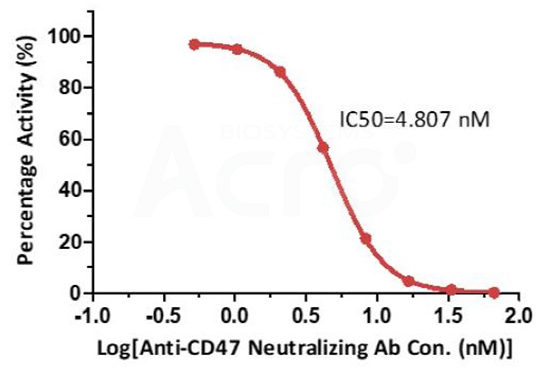
Serial dilutions of anti-CD47 neutralizing antibody (Catalog # CD7-NA002) (1:2 serial dilutions, from 10 μg/mL to 0.04 μg/mL or 66.67 nM to 0.26 nM) was added into CD47: biotinylated SIRP alpha binding reactions. Background was subtracted from data points prior to log transformation and curve fitting (QC tested).
Inhibition of IL-4: IL-4 R alpha binding by Human IL-4 measured using IL-4 [biotinylated]: IL-4 R alpha inhibitor screening kit (Cat. No. EP-132).
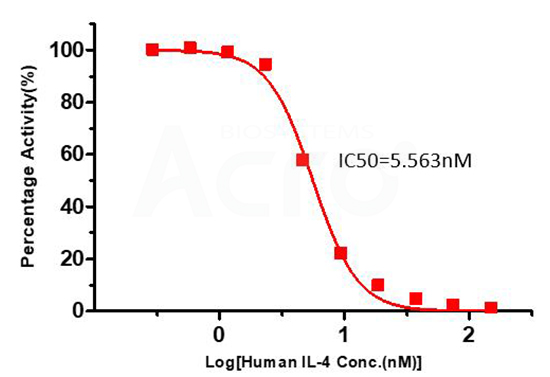
Serial dilutions of Human IL-4(Catalog # EP132-C03) (1:1 serial dilution, from 5 μg/mL to 0.01 μg/mL (295.86-0.58 nM)) was added into IL-4 R alpha: IL-4-Biotin binding reactions. The assay was performed according to the above-described protocol. Background was subtracted from data points prior to log transformation and curve fitting (QC tested).
Inhibition of Integrin α 4 β 7: MAdCAM-1binding by anti-Integrin α 4 β 7 neutralizing antibody measured using Integrin α 4 β 7: MAdCAM-1 [Biotinylated] inhibitor screening kit (Cat. No. EP-155)
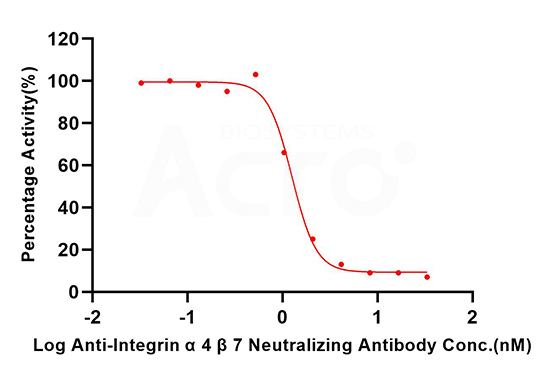
Serial dilutions of Anti-Integrin α 4 β 7 Neutralizing antibody (Catalog # EP155-C04) (1:1 serial dilution, from 5 μg/mL to 0.0098μg/mL) was added into Integrin α 4 β 7: Biotinylated MAdCAM-1 binding reactions. The assay was performed according to the protocol described below. Background was subtracted from data points prior to log transformation and curve fitting (QC tested).
Inhibition of CD73: AMP binding by AMP-CP(CD73 inhibitor) measured using CD73 inhibitor screening kit (Cat. No. EP-166)
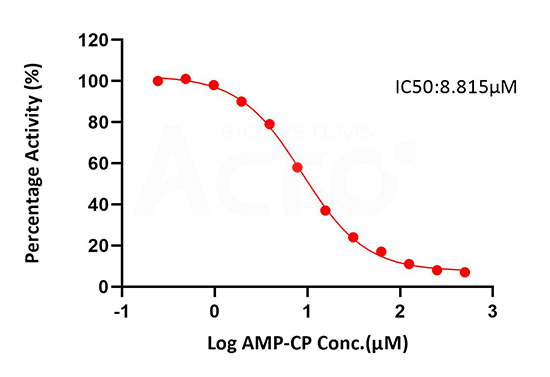
Serial dilutions of AMP-CP (1:1 serial dilution, from 500μm/L to 0.244140625μm/L) was added into CD73: AMP binding reactions. The assay was performed according to the protocol described below. Background was subtracted from data points prior to log transformation and curve fitting (QC tested).
This web search service is supported by Google Inc.









